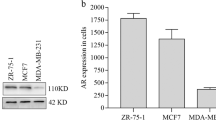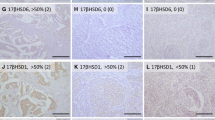Abstract
Background
We postulate that the androgen dehydroepiandrosterone sulfate (DHEAS) may represent an innovative hormonal treatment for estrogen (ER), progesterone (PR) receptor–negative, but androgen receptor (AR)–positive breast cancers by inhibiting breast cancer cell growth through AR stimulation.
Methods
Three ER,PR–negative breast cancer cell lines (HCC 1137, 1954, and 38), were treated with DHEAS. DHEAS-induced growth was measured by a methylthiotetrazole (MTT) proliferation assay and apoptosis by TUNEL fluorescence. Androgen receptor gene expression levels were determined using quantitative real-time polymerase chain reaction (q-RT-PCR).
Results
HCC cell lines 1954 and 1937 were positive for AR expression; HCC 38 was weakly positive. MTT analysis showed DHEAS-induced decreases in cell proliferation of 47% in HCC 1937, 27% in HCC 1954, and 0.4% in HCC 38. Ten days of culturing HCC 1954 cells after the removal of DHEAS resulted in a 3.5-fold increase in growth. Continuous treatment for the same duration induced a 2.8-fold decrease in growth. Parallel experiments showed no significant changes in HCC 38 cultures. TUNEL assays showed DHEAS-induced apoptosis fold increases of 2.8 in HCC 1937, 1.9 in HCC 1954, and no significant difference in HCC 38 cultures. Q-RT-PCR of HCC 1954 cells showed a 6-fold DHEAS-induced decrease in AR gene expression at 4 h. Co-treatment with Casodex nullified this effect.
Conclusions
DHEAS inhibited growth of ER,PR–negative, AR–positive breast cancer cells. DHEAS was cytotoxic to these breast cancer cells via the apoptosis pathway. DHEAS may be an effective treatment for a population previously excluded from hormone therapy.
Similar content being viewed by others
REFERENCES
McGuire WL. An update on estrogen and progesterone receptors in prognosis for primary and advanced breast cancer. In Iacobelli S, editors, et al. Hormones and Cancer vol. 15, Raven Press, New York, 1980;pp 337–344
Isola JJ. Immunohistochemical demonstration of androgen receptor in breast cancer and its relationship to other prognostic factors. J Pathol 1993;170:31–35
Brys M, Wojcik M, Romanowicz-Makowska H, Krajewska WM. Androgen receptor status in female breast cancer: RT-PCR and Western blot studies. J Cancer Res Clin Oncol 2002;128:85–90
Henderson IC, Canellos GP. Cancer of the breast: The past decade. N Engl J Med 1980;302:17–30,78–80
Goldenberg IS, Waters N, Ravdin RS, et al. Androgenic therapy for advanced breast cancer in women. A report of the Cooperative breast Cancer Group. JAMA 1973;223:1267–1268
Manni A, Arafah BM, Pearson OH. Androgen-induced remissions after antiestrogen and hypophysectomy in stage IV breast cancer. Cancer 1981;48:2507–2509
Litvinov IV, Antony L, Isaacs JT. Molecular characterization of an improved vector for evaluation of the tumor suppressor versus oncogene abilities of the androgen receptor. Prostate 2004;61:299–304
Toth-Fejel S, Cheek J, Calhoun K, et al. Estrogen and androgen receptors as comediators of breast cancer cell proliferation. Arch Surg 2004;139:50–54
Morris KT, Toth-Fejel S, Schmidt, Fletcher WS, Pommier RF. High DHEA-sulfate predicts breast cancer progression during new aromatase inhibitor therapy and stimulates breast cancer cell growth in tissue culture: A renewed role for adrenalectomy. Surgery 2001;130:947–953
Harrell JC, Dye WW, Allred DC, et al. Estrogen receptor positive breast cancer metastases: altered hormonal sensitivity and tumor aggressiveness in lymphatic vessels and lymph nodes. Cancer Res 2006;66:9308–9315
Trivieri L Jr, Anderson JW. Natural hormone replacement therapy. In Trivieri L Jr, editor, Alternative Medicine, the Definitive Guide. Celestial Arts, Berkeley, 2002;370–371
Author information
Authors and Affiliations
Corresponding author
Rights and permissions
About this article
Cite this article
Hardin, C., Pommier, R., Calhoun, K. et al. A New Hormonal Therapy for Estrogen Receptor–Negative Breast Cancer. World J Surg 31, 1041–1046 (2007). https://doi.org/10.1007/s00268-007-0694-8
Published:
Issue Date:
DOI: https://doi.org/10.1007/s00268-007-0694-8




